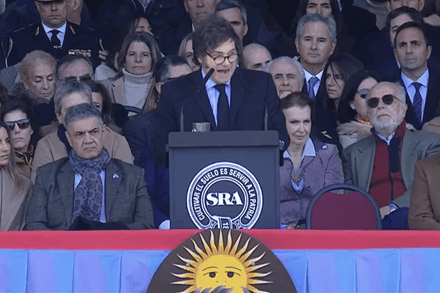Although there had been speculation that the government might eliminate the remaining export taxes on beef, during the opening ceremony of the 137th edition of the Rural Exhibition, President Javier Milei announced a reduction in export duties for beef and poultry, as well as for major grains.
Now, beef cuts other than cow meat (which already has no export duties) will see their tax rate drop from 6.75% to 5%, the same as for poultry. Meanwhile, export duties on corn and sorghum will drop from 12% to 9.5%; sunflower duties will go from 7.5% and 5% to 5.5% and 4%, respectively; and soybean duties will be reduced from 33% to 26% for whole grains, and from 31% to 24.5% for byproducts.
In fact, this reduction for grains had already been applied on a temporary basis from January 26 to June 30. Before the measure expired, the government announced it would be extended through next year for wheat and barley (which were being planted), while duties on the remaining grains and byproducts returned to their previous levels on July 1 — sparking widespread protests from the agricultural sector. Now, the first-half duty rates will be reinstated for all these products and, according to the announcement, they will not be raised again.
Producer organizations welcomed the announcements as a sign that their voices were heard and that the government wants to move forward in the direction of eliminating export taxes altogether, along with the promise that this partial reduction is definitive. Privately, many felt it was insufficient, but believe the Milei administration did what it could within its current room for maneuver. In the case of grains, they said it eases a delicate situation, unlike what is happening with the livestock sector.
Meanwhile, meat industry sources said the reduction in beef export duties will have no real economic impact. “This reduction doesn’t help, but if it were bigger, it would immediately be passed on to cattle prices, which would complicate things even more,” said one meatpacker. “Hopefully this signal acts as a positive incentive for producers so we can slightly increase the herd,” added another industry source. A third commented, “This doesn’t move the needle; all we can do now is cross our fingers and hope Trump gives us something,” referring to the rumored negotiations between Argentina and the United States to expand the beef tariff quota, currently set at 20,000 tons per year and, according to the most optimistic reports, potentially increasing to 80,000 tons.
Annualizing the foreign currency revenue from beef exports in the first half of the year (estimated at about US$ 3.17 billion), and assuming that 50% comes from steer beef exports, the “savings” from the 1.75-point reduction in the export tax would not exceed US$ 24 million per year — just 0.7% of the total exported value.

Photo: La Nación